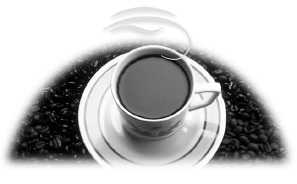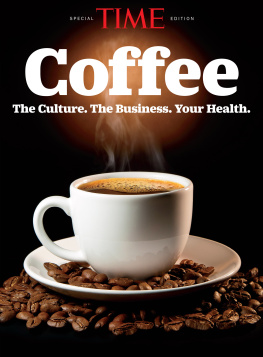How to Open a Financially Successful
Coffee, Espresso & Tea Shop
Elizabeth Godsmark, Lora Arduser and
Douglas R. Brown
This Atlantic Publishing eBook was professionally written, edited, fact checked, proofed and designed. Over the years our books have won dozens of book awards for content, cover design and interior design including the prestigious Benjamin Franklin award for excellence in publishing. We are proud of the high quality of our books and hope you will enjoy this eBook version, which is the same content as the print version.
How to Open a Financially Successful Coffee, Espresso & Tea Shop
Copyright 2014 Atlantic Publishing Group, Inc.
1405 SW 6th Avenue Ocala, Florida 34471 Phone 800-814-1132 Fax 352-622-1875
Website:
SAN Number: 268-1250
No part of this publication may be reproduced, stored in a retrieval system, or transmitted in any form or by any means, electronic, mechanical, photocopying, recording, scanning, or otherwise, except as permitted under Section 107 or 108 of the 1976 United States Copyright Act, without the prior written permission of the Publisher. Requests to the Publisher for permission should be sent to Atlantic Publishing Group, Inc., 1405 SW 6th Avenue, Ocala, Florida 34471.
Library of Congress Cataloging-in-Publication Data
Brown, Douglas R.
How to open and operate a financially successful coffee, espresso and tea shop : with companion CD-ROM / by Douglas R. Brown. -- Revised 2nd edition.
pages cm
Includes bibliographical references and index.
ISBN-13: 978-1-60138-905-3 (alk. paper)
ISBN-10: 1-60138-905-1 (alk. paper)
1. Coffeehouses--Management. 2. Coffeehouses--Finance. I. Godsmark, Elizabeth. How to open a financially successful coffee, espresso & tea shop. II. Title. III. Title: How to open and operate a financially successful coffee, espresso & tea shop.
TX911.3.M3G63 2014
647.95068--dc23
2013045801
LIMIT OF LIABILITY/DISCLAIMER OF WARRANTY: The publisher and the author make no representations or warranties with respect to the accuracy or completeness of the contents of this work and specifically disclaim all warranties, including without limitation warranties of fitness for a particular purpose. No warranty may be created or extended by sales or promotional materials. The advice and strategies contained herein may not be suitable for every situation. This work is sold with the understanding that the publisher is not engaged in rendering legal, accounting, or other professional services. If professional assistance is required, the services of a competent professional should be sought. Neither the publisher nor the author shall be liable for damages arising herefrom. The fact that an organization or website is referred to in this work as a citation and/or a potential source of further information does not mean that the author or the publisher endorses the information the organization or website may provide or recommendations it may make. Further, readers should be aware that Internet websites listed in this work may have changed or disappeared between when this work was written and when it is read.
TRADEMARK DISCLAIMER: All trademarks, trade names, or logos mentioned or used are the property of their respective owners and are used only to directly describe the products b eing provided. Every effort has been made to properly capitalize, punctuate, identify, and attribute trademarks and trade names to their respective owners, including the use of and wherever possible and practical. Atlantic Publishing Group, Inc. is not a partner, affiliate, or licensee with the holders of said trademarks.

A few years back we lost our beloved pet dog Bear, who was not only our best and dearest friend but also the Vice President of Sunshine here at Atlantic Publishing. He did not receive a salary but worked tirelessly 24 hours a day to please his parents.
Bear was a rescue dog who turned around and showered myself, my wife, Sherri, his grandparents Jean, Bob, and Nancy, and every person and animal he met (well, maybe not rabbits) with friendship and love. He made a lot of people smile every day.
We wanted you to know a portion of the profits of this book will be donated in Bears memory to local animal shelters, parks, conservation organizations, and other individuals and nonprofit organizations in need of assistance.
Douglas and Sherri Brown
PS: We have since adopted two more rescue dogs: first Scout, and the following year, Ginger. They were both mixed golden retrievers who needed a home.
Want to help animals and the world? Here are a dozen easy suggestions you and your family can implement today:
- Adopt and rescue a pet from a local shelter.
- Support local and no-kill animal shelters.
- Plant a tree to honor someone you love.
- Be a developer put up some birdhouses.
- Buy live, potted Christmas trees and replant them.
- Make sure you spend time with your animals each day.
- Save natural resources by recycling and buying recycled products.
- Drink tap water, or filter your own water at home.
- Whenever possible, limit your use of or do not use pesticides.
- If you eat seafood, make sustainable choices.
- Support your local farmers market.
- Get outside. Visit a park, volunteer, walk your dog, or ride your bike.
Five years ago, Atlantic Publishing signed the Green Press Initiative. These guidelines promote environmentally friendly practices, such as using recycled stock and vegetable-based inks, avoiding waste, choosing energy-efficient resources, and promoting a no-pulping policy. We now use 100-percent recycled stock on all our books. The results: in one year, switching to post-consumer recycled stock saved 24 mature trees, 5,000 gallons of water, the equivalent of the total energy used for one home in a year, and the equivalent of the greenhouse gases from one car driven for a year.
The companion CD-ROM is not available for download with this electronic version of the book but it may be obtained separately by contacting Atlantic Publishing Group at sales@atlantic-pub.com

Introduction
The market for specialty, gourmet coffees and teas is an exciting growth area of the beverage service industry. Sales of specialty coffees alone increased from approximately $45 million in the early 1960s to more than $10 billion in the United States by 2014, and steady growth is forecasted in this buoyant sector of the beverage market.
Today, the United States consumes more coffee per capita than any other country in the world and consumption is likely to increase at a rate of 2.7 percent per year through 2015 according to the SBA National Information Clearinghouse. According to market analysts, the increase in coffee consumption is entirely attributable to the rapid growth of the specialty coffee segment of the beverage industry. About 37 percent of the U.S. population are regular consumers of gourmet coffee; a remarkable achievement considering that, just over a decade ago, only 3 percent of the population indulged in such delights on a regular basis. The percentage reached a pre-recession peak of 40 percent between 2004 through 2006. In 1991, there were as few as 500 coffee bars throughout the United States, today there are in excess of 20,000!









_fmt.jpeg)

